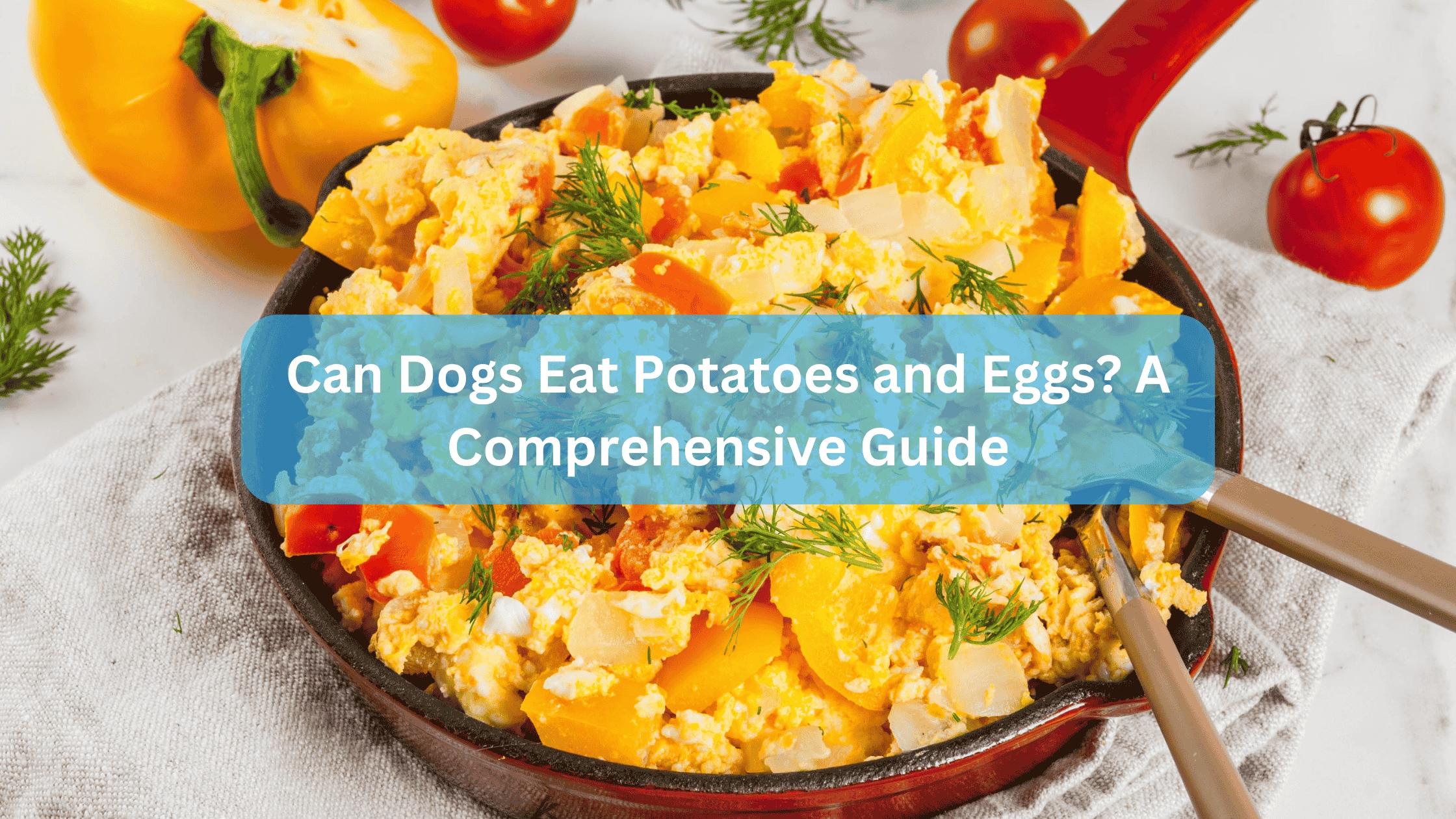Can Dogs Eat Potatoes and Eggs? As pet owners, we often wonder what human foods are safe for our furry friends.
Two common ingredients that come up frequently are potatoes and eggs. Not only are these ingredients popular in many dishes, but they also provide various nutritional benefits.
This article will explore whether dogs can eat potatoes and eggs, how to prepare them safely, and address common questions about their consumption.
Can Dogs Eat Potatoes and Eggs? – Dishes Made with Potatoes and Eggs
Potatoes and eggs can be combined in a variety of dishes that are safe for dogs when prepared correctly. Here are some tasty recipes:
- Potato and Egg Scramble: A simple dish made by scrambling eggs and mixing them with cooked, plain potatoes. This dish is nutritious and can be a delightful treat for your dog.
- Potato Birthday Cake: Mix minced chicken or beef with eggs and grated carrots, pour the mixture into muffin tins, and bake. Once cooled, top with mashed potatoes (without salt or spices) for a special birthday treat.
- Mashed Potatoes with Yogurt: For a creamy treat, mash cooked potatoes and mix them with a tablespoon of plain yogurt, avoiding harmful ingredients like butter or salt.
Can Dogs Eat Potatoes?
Yes, dogs can eat potatoes, but there are important guidelines to follow:
- Cooked Only: Always serve cooked potatoes, as raw potatoes contain solanine, a toxic compound that can be harmful to dogs.
- Plain Preparation: Avoid adding butter, oil, salt, or any seasonings. Mashed potatoes without harmful ingredients are acceptable.
- Portion Control: Potatoes should not make up more than 10% of your dog’s daily caloric intake to avoid weight gain and digestive issues.
Can Dogs Eat Eggs?
Absolutely! Eggs are a great source of protein and other essential nutrients for dogs. When feeding eggs to your dog:
- Cook Thoroughly: Always cook eggs to eliminate the risk of salmonella.
- No Additives: Avoid adding salt, butter, or milk when preparing eggs for your dog.
- Moderation is Key: Like potatoes, eggs should be given as an occasional treat rather than a staple in their diet.
How to Safely Prepare Potatoes and Eggs for Dogs
To ensure the safety of potatoes and eggs for your dog:
- Never feed raw potatoes or potato skins, as they can contain harmful toxins.
- Wash and peel potatoes before cooking.
- Avoid harmful ingredients like garlic, onion, butter, or salt.
- Cook potatoes by boiling, baking, or mashing without additives.
- Cook eggs thoroughly, avoiding any seasoning or additives.
How Often Can I Safely Feed My Dog Potatoes?
Potatoes should be treated as an occasional treat rather than a regular part of your dog’s diet.
A small serving once or twice a week is generally safe, but always consider your dog’s overall diet and caloric intake.
Are There Any Specific Health Benefits of Eggs for Dogs?
Yes, eggs provide several health benefits for dogs:
- High Protein Content: Eggs are an excellent source of easily digestible protein, which is essential for muscle development and immune function.
- Fatty Acids: The yolk contains omega-3 and omega-6 fatty acids, which promote healthy skin and coat.
- Vitamins and Minerals: Eggs are rich in vitamins A, B12, and D, as well as minerals like iron and selenium, which support overall health.
What Are the Signs of Egg or Potato Poisoning in Dogs?
Signs of poisoning can include:
- Vomiting and diarrhea
- Excessive salivation or panting
- Lethargy or weakness
- Abdominal pain or discomfort
If you suspect your dog has ingested raw potatoes or spoiled eggs, contact your veterinarian immediately.
Can Puppies Eat Potatoes and Eggs Like Adult Dogs?
Puppies can eat potatoes and eggs, but they should be introduced gradually and in small amounts.
It’s essential to ensure that these foods do not replace their balanced puppy diet, which is crucial for their growth and development.
Are There Any Potential Allergies My Dog Might Have to Potatoes and Eggs?
Yes, dogs can develop allergies to both potatoes and eggs, although they are relatively uncommon. Symptoms of food allergies may include:
- Itchy skin or rashes
- Chronic ear infections
- Gastrointestinal upset such as vomiting or diarrhea
If you notice these symptoms after feeding your dog potatoes or eggs, consult your veterinarian.
How Many Eggs and Potatoes Can I Give My Dog in One Sitting?
The amount of potatoes and eggs you can give your dog depends on their size, age, and overall diet. As a general guideline:
- Potatoes: Limit to a small serving, ideally not more than 10% of their daily caloric intake. An average potato has about 130 calories.
- Eggs: One egg per day is generally safe for larger dogs, while smaller breeds should have less. Always monitor your dog’s reaction when introducing new foods.
Can I Mix Cooked Potatoes and Eggs into My Dog’s Regular Meals?
Yes, you can mix small amounts of cooked potatoes and eggs into your dog’s regular meals. This can enhance the flavor and provide additional nutrients.
Just ensure that these additions do not exceed the recommended portion sizes and that your dog’s overall diet remains balanced.
Also Read: German Shepherd Mastiff Mix: A Comprehensive Guide
Also Read: Classical Conditioning Dog Training: A Comprehensive Guide
Conclusion
In summary, dogs can safely eat potatoes and eggs when prepared correctly and served in moderation.
These foods can provide valuable nutrients and variety in your dog’s diet.
Always consult your veterinarian before introducing new foods to ensure they align with your dog’s specific dietary needs.
By following these guidelines, you can enjoy sharing these delicious ingredients with your furry friend while keeping them healthy and happy.
Sources:
- https://wagwalking.com/condition/potato-allergies
- https://mishkagrooming.com/blog/potato-for-dogs/
- https://www.petmd.com/dog/nutrition/can-dogs-eat-potatoes
- https://www.rover.com/blog/can-dogs-eat-eggs/
- https://be.chewy.com/can-dogs-eat-potatoes-everything-you-need-to-know/
- https://nycdoggies.com/wellness/eggs-asparagus-potatoes/
- https://www.akc.org/expert-advice/nutrition/can-dogs-eat-eggs/
- https://wagwalking.com/wellness/can-dogs-eat-eggs







